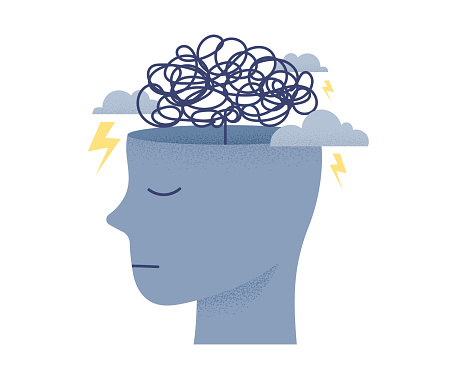The Slow Drip: How Stress Drains the Life from Your Body

Mental health concept vector illustration. Courtesy of Woocat.
People may be under the pressure of stress sometime in their life, whether it be from work, school, personal/societal pressure, relationships, or maybe even personal finance. Stress can also lead to a feeling of sinking in one’s own thoughts. There are different levels of stress and it can affect all systems in one’s body. There are also a variety of different ways to deal with and control it.
Everyone’s way of coping with stress can differ depending on their situation and surroundings. Stress can become long-term and chronic while having long-term side effects. The autonomic nervous system can continue to trigger physical reactions and can cause a wear-and-tear drain on the body.
Stress causes the body to release the hormone cortisol, which is produced by the adrenal glands. Cortisol is important to blood pressure regulation and the normal functioning of several body systems including cardiovascular, circulatory, and male reproduction. Excess amounts of cortisol can affect the normal biochemical functioning of the male reproductive system.
Emotions can build up and drain you mentally and physically can lead to depression, anxiety, or frustration. In an interview with a local student from Wilcox High School Cindy Vidal answered a few questions about stress. “I get stressed most of the time because of my family,” replied Vidal. “Family can be a reason for most teenagers’ stress. It can impact the emotional connection between family members, well-being, their mood, and also the maintenance of the family relationship.”
There are different ways of managing stress levels and maintaining a healthy lifestyle. For instance, engaging in regular physical exercise can relieve stress because it keeps your mind occupied and distracts your mind from things going on in one’s life. Taking at least one hour of your life to a physical activity, whether it be walking, running, or playing any type of sport, has the power to manage any stress going on in one’s life
Getting an adequate amount of sleep each night plays a big role in maintaining stress levels low. It allows your body to relax while at the same time giving your brain a break. Lack of sleep can cause the body to react as if it’s in distress, releasing more of the stress hormone, cortisol. Cortisol is a steroid hormone that affects your adrenal glands. It is responsible for your reactions to danger, increasing your heart rate during a fight.
Your diet also plays a big role in maintaining your stress levels low. A balanced diet can support a healthy immune system and the repair of damaged cells. Eating healthy makes you feel good about yourself mentally and physically. It can also reduce the negative effects of stress on your body, according to Matthew J. Kuchan a senior scientist at Abbott University.
Overall, stress is normal and can be controlled. There are many ways to keep your mind occupied. Keeping a manageable schedule and giving yourself some time to relax is key to having a healthy lifestyle stress free.





